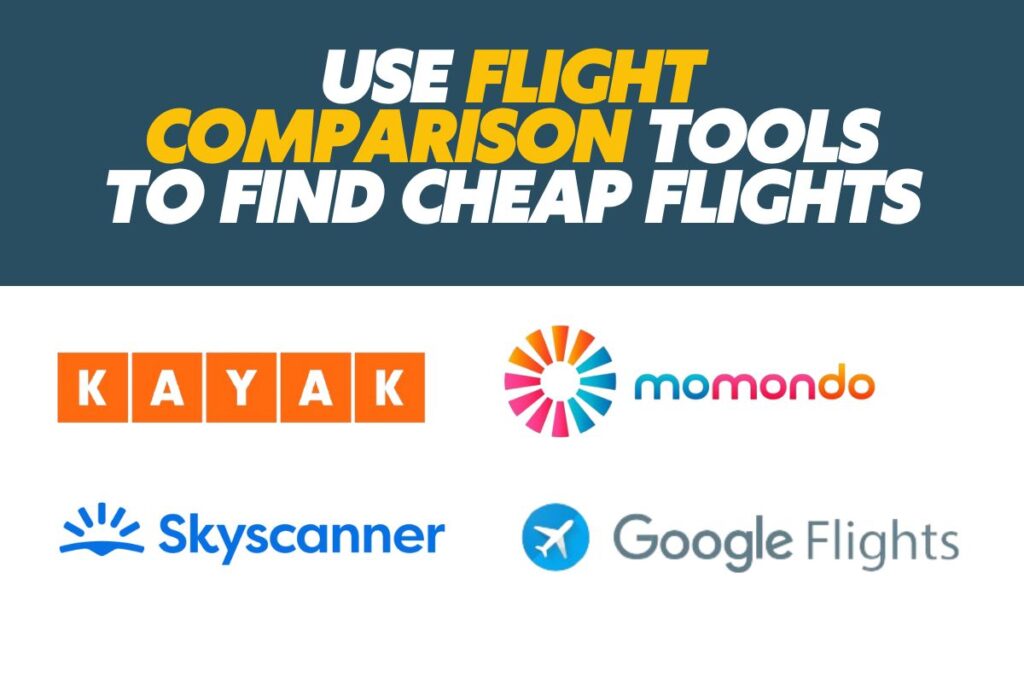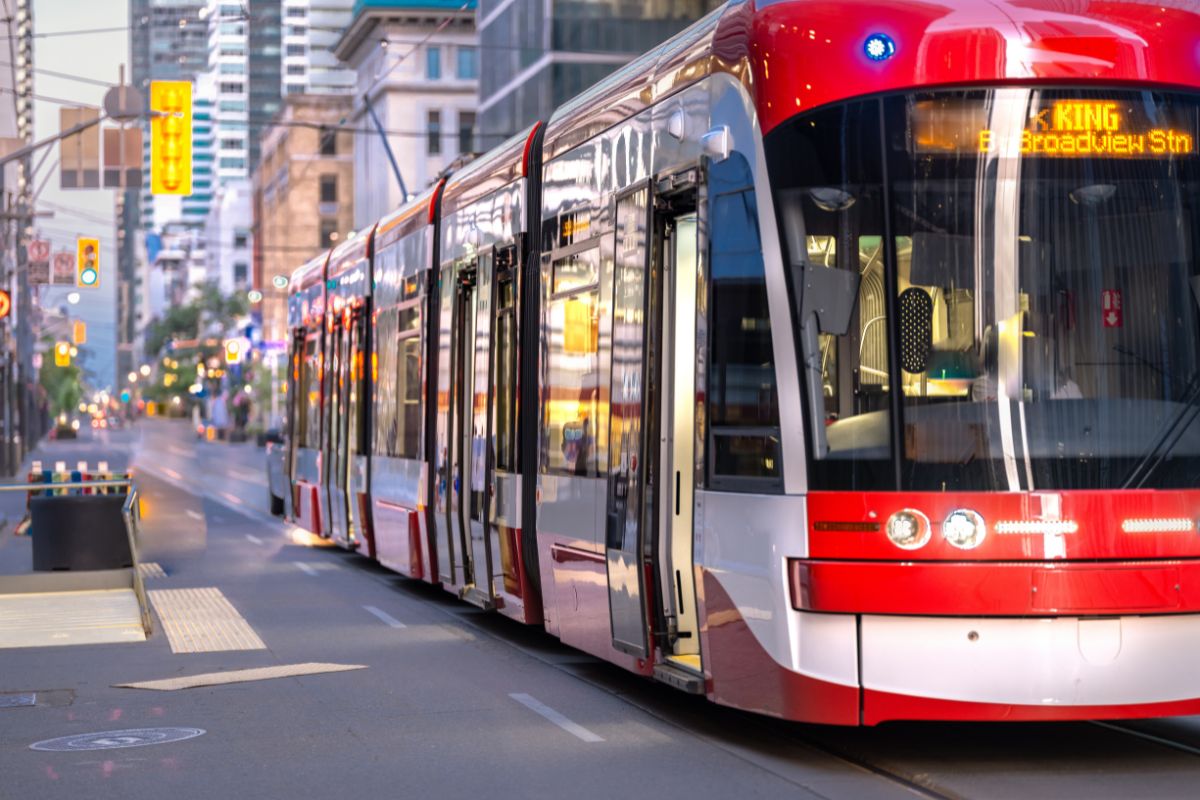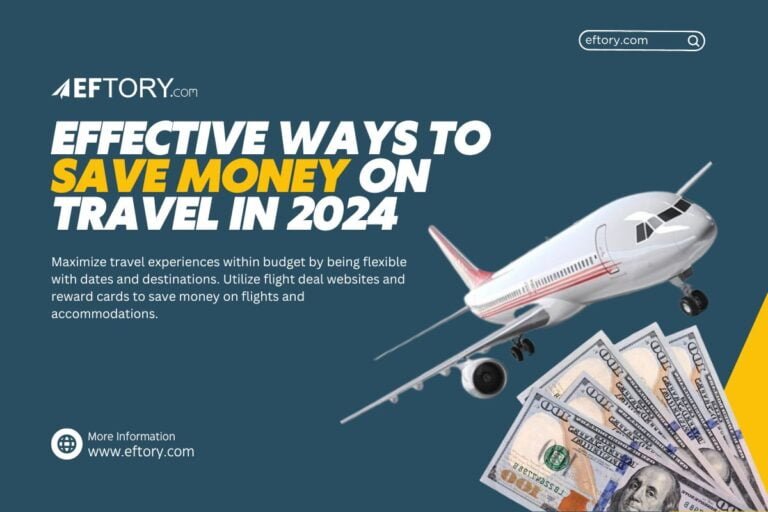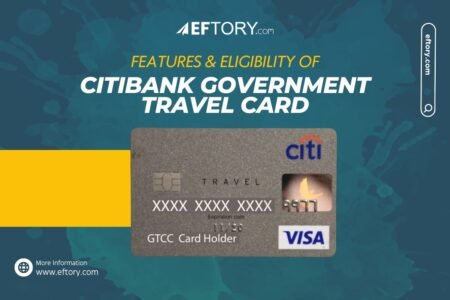Summary: Maximize travel experiences within budget by being flexible with dates and destinations. Utilize flight deal websites and reward cards to save money on flights and accommodations. Explore alternative travel methods and consider volunteer programs to reduce costs and enhance experiences.
Effective Ways to Save Money on Travel in 2024:
Welcome to the ultimate resource for 2024 travel budgeting. As we love to travel, we recognize how critical it is to travel without breaking the bank. These realistic tips allow you to maximize your travel experience within the budget, whether you are making plans for a quick weekend journey or an extended experience.
You don’t have to be rich to travel well.
Eugene Fodor
Be Flexible With Travel Dates and Destinations:
When it comes to saving money on travel, flexibility with both travel dates and destinations is your biggest weapon. Following are the benefits of being flexible with dates & destinations:
- Avoid Peak Season Surges: Airlines understand anyone wants to journey throughout the top times (summer, vacations). They jack up prices to fulfill that demand. By being bendy, you may goal shoulder seasons (spring & fall) or maybe unpopular weekdays within peak seasons. These times often see appreciably decreased flight costs.
- Explore Hidden Gems: Popular locations often include a hefty fee tag. But the splendor of flexibility is that you can discover opportunities and interesting locations. Research locations with a lower cost of living, especially for the duration of their shoulder seasons. You may discover hidden gems that offer unique reports without burning a hollow in your pockets.
- Think Outside the Tourist Bubble: Popular tourist regions within a vacation spot tend to be extra steeply-priced. By being flexible, you could remember staying in lesser-recognized neighborhoods or maybe smaller cities close to your fundamental factor of hobby. You’ll regularly discover better offers on accommodation and a greater experience.
- Package Deal Potential: Sometimes, airlines and resorts offer package deal deals that integrate flights and accommodation at a reduced fee. With flexible journey dates, you have a better risk of finding those offers, maximizing your financial savings on each factor of your trip.
For Example:
You dream of visiting Europe in the summer (peak season). A quick Google Flights search shows a round-trip flight from New York (JFK) to Paris (CDG) in July for around $1200. That might be out of your budget.
Now by being flexible:
- Flexible Dates: Instead of locking yourself into July, consider the shoulder season, September. Flights in September for the same route might be significantly cheaper, perhaps around $800. You’d still enjoy pleasant weather in Paris and avoid the summer crowds.
- Flexible Destination: Maybe Paris isn’t the only option in Europe. What about Prague in the Czech Republic? It’s a beautiful city with a rich history and lower cost of living. A quick search reveals flights to Prague (PRG) in September for around $700, even cheaper than Paris.
By being flexible with your travel dates and destinations, you can see the potential savings:
- Original Paris Trip (July): $1200 (round-trip flight)
- Flexible Option 1 (Paris, September): $800 (round-trip flight) – Saving $400.
- Flexible Option 2 (Prague, September): $700 (round-trip flight) – Saving $500.
If you’re flexible and have some free time, some airlines and travel agencies offer incredible last-minute deals to fill empty seats or hotel rooms. This can be a gamble, but for the adventurous traveler, it can unlock amazing travel experiences at rock-bottom prices.
Save Money on Flights:
Utilize flight deal websites and apps like Google Flights, Scott’s Cheap Flights, Secret Flying, or The Flight Deal. These platforms offer features like:
- Price Tracking: Monitor rate fluctuations in your favored places.
- Error Fares: Get notified about mistakenly cheap fares (act fast, these disappear speedy).
- Deal Alerts: Receive alerts on curated offers to various destinations.
Be Strategic About Booking:
- Book in Advance (sometimes): While not a guaranteed rule, statistically, booking domestic flights within the US 1-3 months in advance might yield better prices. However, always rely on price tracking for the latest information.
- Weekdays for Booking Wins: Traditionally, Tuesdays and Wednesdays see slight price drops compared to weekends. Try to book during these weekdays if possible.

Avoid Hidden Costs:
- Pack Light, Save Money: Avoid checked baggage fees by packing efficiently and utilizing carry-on luggage allowances. Opt for packing cubes and versatile clothing options.
- Beware of Extra Fees: Be mindful of additional airline fees like seat selection or in-flight meals. Consider bringing your entertainment and snacks to avoid these extra costs.
Explore Alternative Travel Methods:
- Buses or Ferries: Depending on distance and budget, consider trains, buses, or ferries for shorter journeys. Sometimes these options offer scenic adventures and can be surprisingly comfortable.
By implementing these strategies, you can become a flight-booking pro and save money on your next adventure.
Use Travel Rewards and Discount Cards:
Discount cards and travel rewards can be effective tools for saving money on travel, but it’s important to utilize them wisely. How to optimize your savings is as follows:
Choosing the Right Travel Rewards Card:
- Certain credit cards give rewards for general spending, hotel points, airline-specific miles, or a mix of all three. Select a credit card that fits your travel preferences (e.g., hotel stays vs. frequent flyer miles).
- A few cards with extensive reward programs charge an annual fee. Make sure the benefits outweigh the yearly cost for you.
- Upon fulfilling minimum spending conditions, a number of cards give significant sign-up bonuses. This could be a fantastic method to raise money for your trip.
How to Use Reward Cards?
- Use your rewards card to pay for lodging, transportation, flights, and even travel insurance to rapidly accrue points or miles.
- A lot of credit cards offer extra miles or points for things like dining, travel, and gas. Make the most of your daily expenditures in these categories.
- With certain cards, you can transfer points at a favorable exchange rate to hotel or airline loyalty programs. This can provide more flexibility when redeeming your rewards.
Discount Cards:
Discount cards can be a great way to save money on various travel expenses, from accommodation and car rentals to attractions and activities.
Membership Programs:
- AAA (American Automobile Association): Offers savings on travel insurance, theme parks, hotels, and car rentals. In addition to additional advantages for car owners, it frequently includes roadside support.
- AARP (American Association of Retired Persons): Provides savings on lodging, vehicle rentals, cruises, airfare, and tours to individuals over 50. They also give discounts on dining establishments, entertainment, and medical services.
- Student Travel Membership Programs: Companies such as STA Travel and ISIC (International Student Identity Card) provide student-only discounts on airfare, lodging, transportation, and attractions.
Destination-Specific Discount Cards:
- CityPASSes: Popular tourist destinations like New York, Chicago, or London offer CityPASSes. These passes grant discounted entry to multiple popular attractions within a selected timeframe, often saving you a big amount compared to buying individual tickets.
- Museum & Attraction Passes: Some cities or regions offer passes that provide discounted entry to a collection of museums, historical sites, or other attractions.
Use Public Transportation:
Public transportation can save a big amount while traveling. Here’s how using it can save you money on your next trip:

- Significant Savings Compared to Cars: The cost of owning and running an automobile is high and includes maintenance, insurance, gas, parking, and auto payments. The majority of these expenses can be avoided by public transportation, making it a far more affordable mode of traveling, particularly in places with well-established networks.
- Flat Fares vs. Distance-Based Rates: Public transportation frequently uses a flat fare system, in contrast to ride-sharing services like Uber and taxis, where prices rise with distance traveled. This implies that, regardless of distance traveled, you can travel inside a defined zone for a single, fixed fee.
More Exploration:
- Efficient Multi-Stop Travel: Networks of transportation link different areas of a city or region. Unlike taxis or individual tickets for each travel, you can visit many destinations at a reduced rate by purchasing daily or weekly passes.
- Hidden Gems and Local Flavor: By taking public transportation, you are able to go beyond the main tourist sites and discover hidden neighborhoods, local markets, and genuine experiences that may not be possible to get by car.
Volunteer and work exchange programs:
Volunteer and work exchange programs can be fantastic ways to explore the world while saving a significant amount of money on travel expenses. These programs link volunteers with businesses or people in need of assistance with a range of tasks. You may be able to obtain free or heavily discounted lodging and meals in return for your time and abilities.
Reduced Accommodation and Food Costs:
- In return for your assistance, a lot of volunteer and work exchange organizations offer free or greatly discounted accommodation. This could be a stay with a local family, a dorm bed at a hostel, or a private room in a volunteer house.
- Meals, usually breakfast or dinner, are provided as part of the program. This allows you to try local cuisine while reducing your everyday food expenses.
Travel and Activity Perks:
- Free Tours and Activities: As part of the experience, some programs may include free or significantly discounted tours, cultural events, or language instruction. This saves your big amount of money while exploring the location and discovering the local way of life.
- Discounted Travel Opportunities: Travel to and from a certain location may be less expensive if you take part in a program there. It’s common to network with other volunteers and cut the cost of travel.

Pack light and avoid baggage fees:
- Heavy fees are imposed by many airlines, particularly low-cost carriers, for checked baggage. Your trip expenses could quickly increase by hundreds of dollars as a result of these fees, particularly if you’re checking bags for several people.
- You can completely avoid these costs by using carry-on luggage allowances and packing light, freeing up cash for adventures and other necessities.
Save Money by making meals yourself:
Cooking your own meals doesn’t have to be complicated or time-consuming. With a little planning and strategies, you can make delicious and healthy meals that can save your money.
- Make a grocery list and schedule your meals in advance to prevent impulsive purchases at the supermarket. Following a list enables you to purchase only what you need and stay inside your budget.
- Make Use of Leftovers Make more food and arrange your meals such that leftovers are considered. The next day, leftovers can be repurposed into inventive lunches or speedy dinners.
- Look for neighborhood grocery stores or farmers’ markets if you’re lodging in an apartment or other structure with a kitchen. When compared to convenience stores or popular destinations, these frequently provide fresh, in-season ingredients at reduced costs.
Smart Shopping and Cooking Strategies:
- Seasonal food is usually better-tasting and more reasonably priced. The best prices on fresh products tend to be found in local markets.
- Basics like pasta, rice, beans, and canned products are sometimes far less expensive and just as good as name brands when purchased from a generic retailer.
- Consider purchasing basic necessities (rice, pasta, and lentils) in bulk from wholesale stores if you’re traveling in a group or intend to remain for a long time. Just be aware of portion sizes and expiration dates to prevent wastage.
- Avoid bottled water purchases; they are costly and wasteful. Invest in a reusable water bottle that you can fill with tap water that has been filtered, or buy a purifying filter that you can use while on the road.
- Make a quick breakfast in your apartment or room instead of spending money on pricey hotel breakfasts. Affordable and satisfying options include toast with peanut butter, yogurt with fruit, and oatmeal.
Frequently Asked Questions:
How can I save money to afford travel?
Avoid unnecessary expenses like dining out and entertainment. Consider using public transport, carpooling, or even cycling for short distances.
When is the cheapest time to travel?
Shoulder seasons (spring and fall) are generally cheaper than peak season (summer and winter). Consider traveling during weekdays.
How can I find cheap flights?
Use flight comparison tools and be flexible with your travel dates. Book flights in advance (around 8 months for overseas travel) or look for last-minute deals.
What are the best ways to save on accommodation?
Consider alternatives to hotels like hostels, guesthouses, vacation rentals (especially for groups). Stay updated for deals and discounts offered by booking platforms.
How can I save money on food while traveling?
Skip expensive restaurants and opt for local markets, street food, or grocery stores. Cook your own meals if you have access to a kitchen.
How can I save money on activities and attractions?
Research free activities in your destination like parks, museums with free entry days, or cultural events. Look for city passes that offer discounts on multiple attractions.






